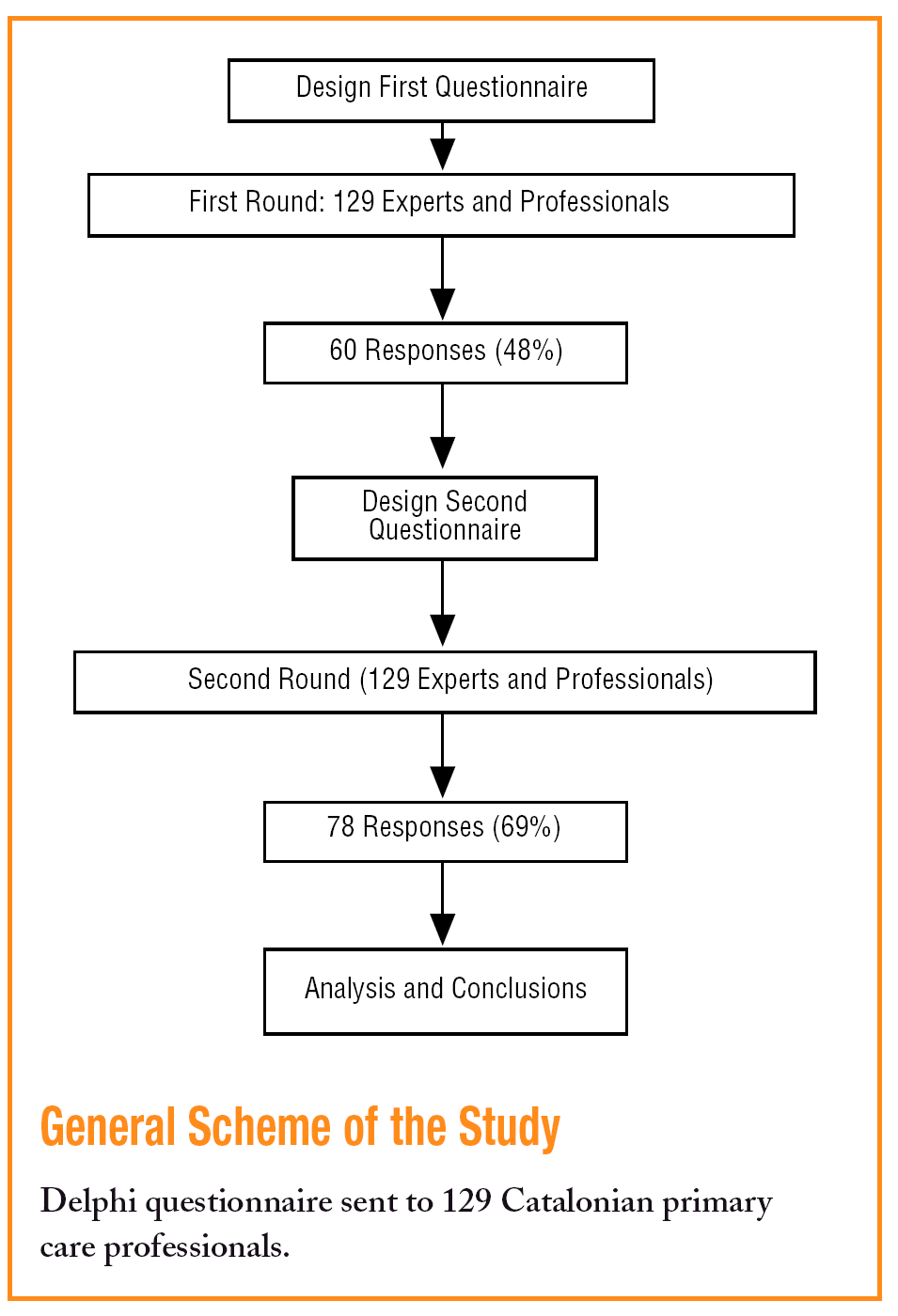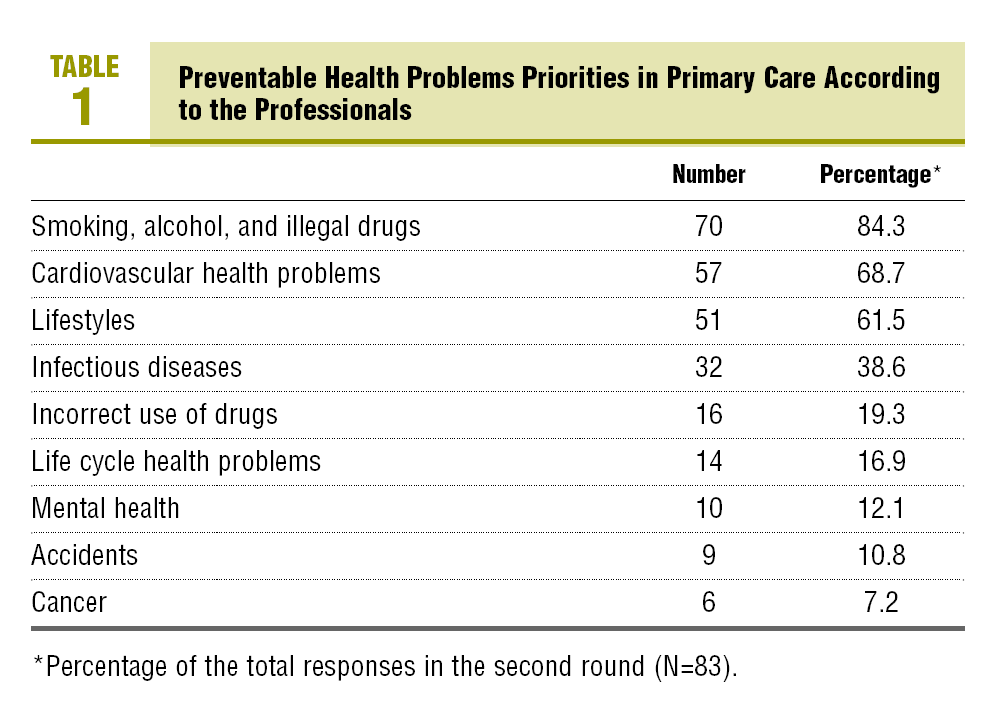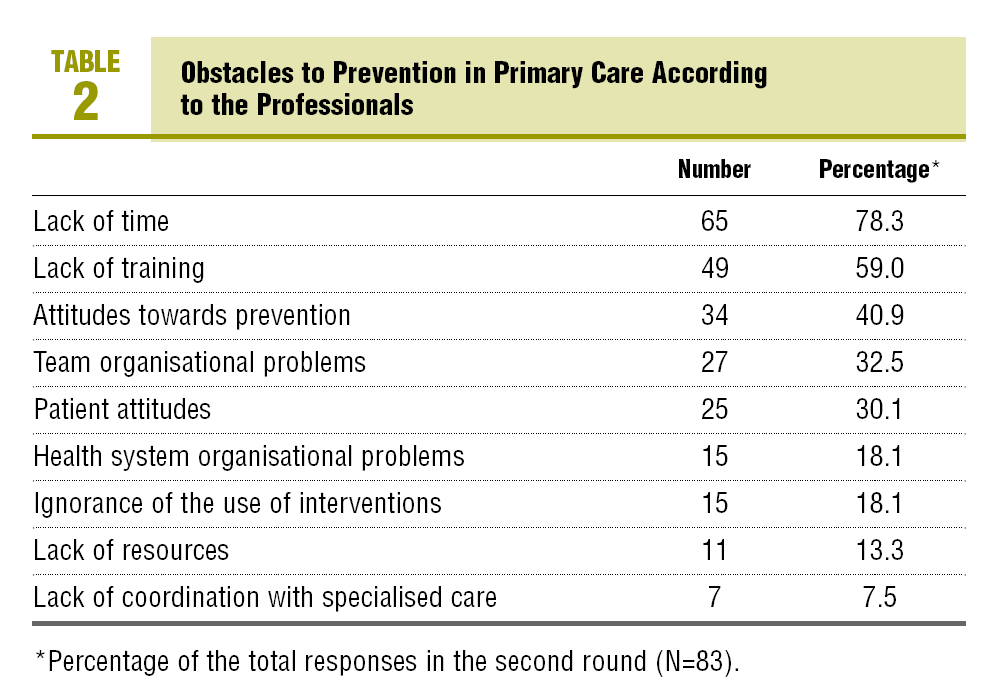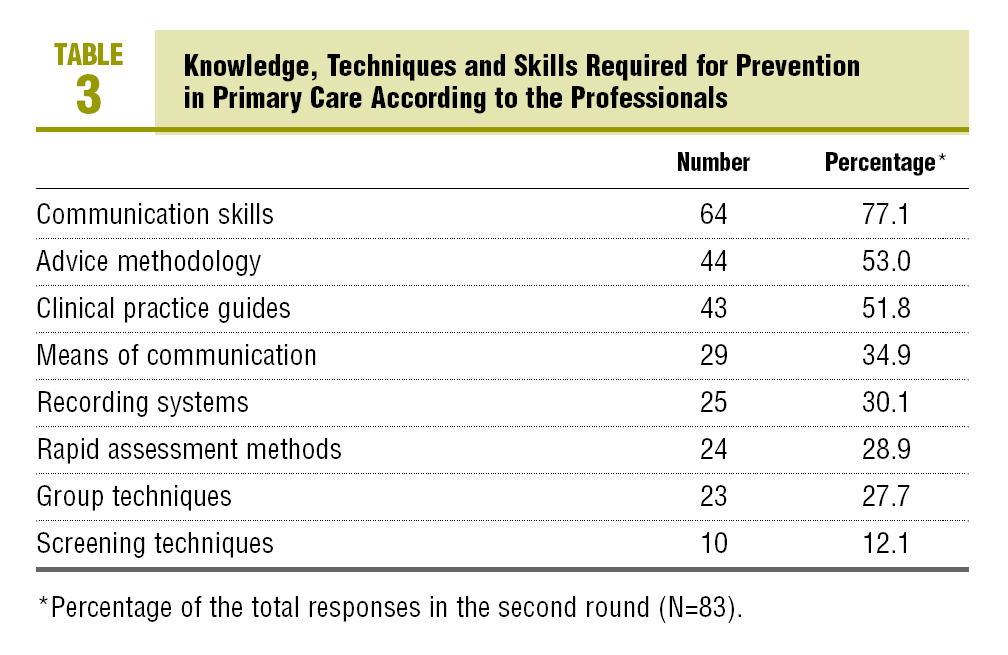Introduction
Although prevention forms an essential part of health activity, the professionals often do not carry out the necessary preventive activities for different reasons, lack of time, lack of confidence in its effectiveness, or lack of training1,2 are among those that are usually mentioned. In practice, it is difficult to expect big changes in the time available for prevention, therefore the publication of systematic reviews, that clearly establish which are the most effective preventive measures in the health environment, is very important.3,4 The implementation of the Preventive Activities Programme (PAPPS) of the Spanish Society of Family and Community Medicine, in Spain, since 1986 has played a decisive role in the publication of priority interventions, as well as guidelines for their practical implementation in clinics.5,6 However, periodic assessments of the programme demonstrate that the integration of preventive activities into daily clinical practice is still relatively low.7 With the aim of finding out what the professionals think about preventive activities, the PAPPS Health Education Group decided to carry out a qualitative study in March 2004, using Delphi methodology. The Delphi technique has been defined as a method which aids the communication process between a group of experts in approaching a complex problem.8 This technique was used in 1990 by a working group from the Catalonian Society of Family and Community Medicine (CAMFiC) and helped to identify the activities that were considered priorities by primary care professionals, as well as helping to define the PAPPS objectives.9 This article presents the results of the Delphi study carried out in 2004 to find out the priority preventive activities in primary care and the obstacles perceived by the professionals in carrying them out, as well as possible ways to overcome them.
Methods
Following the Delphi study carried out in 19909 on priorities in the prevention and promotion of health in primary care, the PAPPS Health Education Group designed a Delphi study in March 2002 with 4 open questions on health problems, priority prevention activities, barriers to carrying out these activities in clinical practice, and the needs of the professionals as regards the removal of these perceived barriers. They were worded as open questions and sent to a panel of 129 professionals including primary care doctors, nursing staff, technicians, primary care service managers, and public health professionals. The questionnaire was sent to the 129 professionals by e-mail in October 2002, and a reminder was sent in January 2003. The responses to the first round were analysed by the research group and reduced to 3 closed questions and 1 open question, in which they were asked to give a recent example where they experienced difficulties to be able to carry out preventive activities. The second round was sent out to the entire panel in July 2003. The body of the message was a short paragraph to say that it was the end of the study and that the questionnaire could be completed in 5-10 minutes. The responses to the second round were analysed and grouped by the whole research team. The response rate was 48.9% in the first round and 67.4% (83) in the second. Given that there was a high degree of convergence in this second round, with more than 40% of the responses in the first 3 options of each of the 3 closed questions, the process was considered to be completed in this phase.
Results
With regard to the main health problems that can be dealt with in primary care, the majority of responses referred to bad habits, including, smoking, alcohol, and illegal drugs (26.3%), cardiovascular health problems (21.3%), and lifestyle, particularly diet and physical exercise (19.1%) (Table 1). As regards the knowledge and skills which, according to the professionals, would be necessary to better deal with these problems, the responses indicated, communication skills (24.4%) and advice methodology (16.4%), along with clinical practice guidelines (16.4%) (Table 2). Finally, the obstacles and barriers perceived by the professionals to carry out these activities were, lack of time (26%), lack of training (19.6%), and professional attitudes (13.6%) (Table 3).
Discussion
The responses by the expert panel as regards health problems and priority preventive activities are consistent with those recommended by PAPPS itself, as well as other international institutions.3 Perhaps the most novel aspect of the study is that concerning the perceived problems and potential solutions. In this sense, lack of time must be mentioned among the practical problems, as this makes it difficult to approach problems not directly related to the reason for the consultation. It is remarkable that a large percentage of the professionals mentioned their own attitudes as a barrier towards prevention, therefore not just the transmission of knowledge, but also the prejudices of the professionals should be taken into account in training. It appears relevant to approach aspects linked to the attitudes, beliefs and values of the professionals themselves, including their inter-personal emotional skills.
The results should be interpreted with caution due to intrinsic limitations in the methodology used. Delphi studies also have some limitations due to their qualitative character and the subjectivity of the participants and researchers.8
This method has been widely used for studying complex problems since its development in the 1950's, including the definition of research priorities,10 the skills and training needs of the professionals,11,12 or in defining the fields of activity and contents of new disciplines or services.13,14 Also, the selection of the sample, which included professionals with responsibilities in the different medical and nursing associations, and all the PAPPS members, even with the very high response rate for this type of study, does not prevent it from being limited as it is not a representative sample of the professions. In any case, it is firmly established that the Delphi method is able to obtain a panel consensus that avoids personal interaction and the need for experts to meet in person,15,16 which is particularly useful in areas where there might be a theoretical basis or sources of objective data.17 On the other hand, it prevents the direct influence of one person over the others, and enables an overall consensus to be obtained from the panel. The conclusions obtained by the panel by this method has sufficient validity despite the relatively low number of participants, when the expert panel is homogeneous, as in the present study.18
The solutions pointed out by the professionals help to define the needs in structural training, the majority of which can be dealt with by strategies directed towards improving communication skills and optimisation of the limited time available. In this sense, it seems desirable to reinforce training in communication skills, including these directed at managing attitudes and beliefs as regards external clients--users, patients--as internal clients--colleagues, managers, and subordinates--, in future PAPPS activities in health education and health promotion. On the whole, the results obtained in this study are similar to those obtained in the 1990 Delphi study9 with regard to problems with health priorities and the obstacles to integrating preventive activities into primary care. Taking these into consideration, it clearly shows a demand for training in more specific aspects, basically related to communication and advice skills and abilities. The results can be useful to guide strategies directed at helping to integrate these activities into clinical practice, without forgetting the need to set them within the wider public health perspective, where primary care professionals have an important, but not exclusive, responsibility: health promotion must be the objective of everyone.
What Is Known About the Subject
* The Delphi method can be useful to obtain an expert panel view of a complex problem.
* The integration of preventive activities in primary care is limited due to lack of time and other obstacles perceived by the professionals.
What This Study Contributes
* Primary care professionals see lack of time, lack of training and their own attitudes as obstacles to prevention.
* Among the solutions proposed to overcome these obstacles, they highlight training in communication skills and advice methodology, and clinical practice guides.
Evaluation and Methods Department, Public Health Agency, Barcelona, Spain
Spanish version available at www.doyma.es/165.612
A commentary follow this article (page 289)
Correspondence:
M. Nebot.
Servei d´Avaluació i Métodes.
Agència de Salut Pública de Barcelona.
Pl. Lesseps, 1. 08023 Barcelona. España.
Manuscript received April 26, 2006. Manuscript accepted for publication November 15, 2006.















